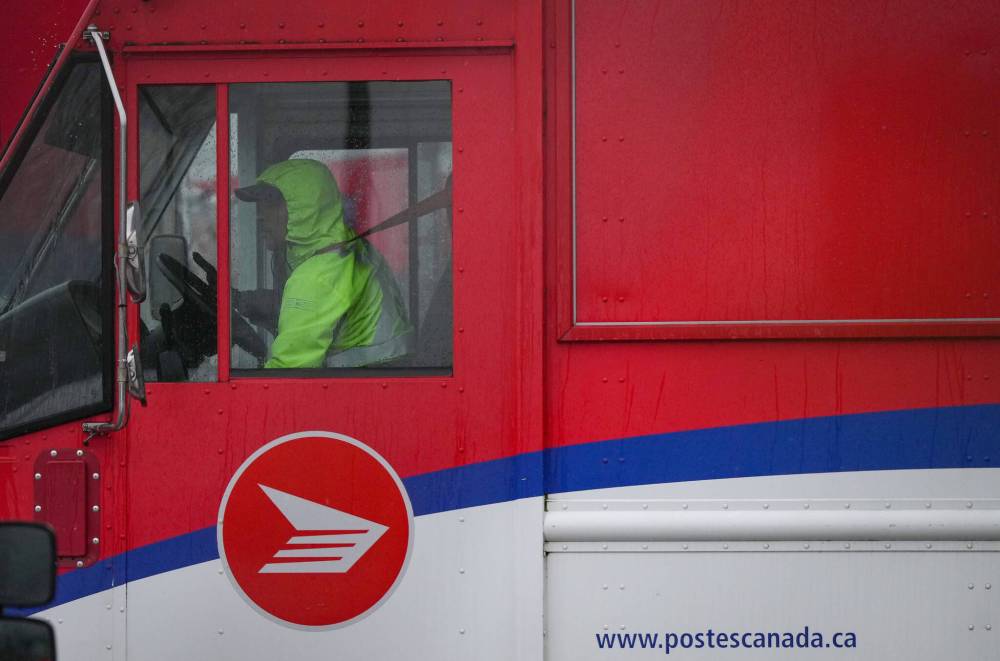Canada Post and the need for change
Advertisement
Read this article for free:
or
Already have an account? Log in here »
To continue reading, please subscribe:
Monthly Digital Subscription
$1 per week for 24 weeks*
- Enjoy unlimited reading on winnipegfreepress.com
- Read the E-Edition, our digital replica newspaper
- Access News Break, our award-winning app
- Play interactive puzzles
*Billed as $4.00 plus GST every four weeks. After 24 weeks, price increases to the regular rate of $19.00 plus GST every four weeks. Offer available to new and qualified returning subscribers only. Cancel any time.
Monthly Digital Subscription
$4.75/week*
- Enjoy unlimited reading on winnipegfreepress.com
- Read the E-Edition, our digital replica newspaper
- Access News Break, our award-winning app
- Play interactive puzzles
*Billed as $19 plus GST every four weeks. Cancel any time.
To continue reading, please subscribe:
Add Winnipeg Free Press access to your Brandon Sun subscription for only
$1 for the first 4 weeks*
*$1 will be added to your next bill. After your 4 weeks access is complete your rate will increase by $0.00 a X percent off the regular rate.
Read unlimited articles for free today:
or
Already have an account? Log in here »
It was a harsh message, delivered by the commissioner reviewing the current bargaining impasse between Canada Post and the Canadian Union of Postal Workers.
“Canada Post is facing an existential crisis: It is effectively insolvent, or bankrupt,” Industrial Inquiry Commissioner William Kaplan wrote. “Without thoughtful, measured, staged, but immediate changes, its fiscal situation will continue to deteriorate.”
Kaplan recommended a host of changes, from the end of daily home delivery to private homes to allowing Canada Post to bring in part-time employees to cover weekend parcel delivery and high-volume periods to the closure of rural post offices. And he wrote that the Canadian Union of Postal Workers and Canada Post have to take significant action.

Darryl Dyck / The Canadian Press files
A review recommends Canada Post stop daily delivery to private homes.
“If implemented, these changes may return Canada Post to some degree of financial viability … but in a manner that reflects the 2025 realities of disappearing letter mail and a highly competitive parcel delivery environment,” Kaplan wrote. “The world has changed, and both Canada Post and CUPW must evolve and adapt. Merely tinkering with the status quo is not an option.”
All of that led to Friday, and the CUPW’s decision to set a strike deadline for that day, a strike deadline that cannot help but erode Canada Post’s viability even more.
“The recent labour dispute resulted in a further, measurable, and almost certain permanent desertion of long-standing customers who moved their business elsewhere and who have advised Canada Post that they are never coming back (especially absent long-term collective agreements and the certainty they provide against further labour disruptions, particularly in peak season),” Kaplan wrote in his report.
It’s hard to not see the real threat that a strike will continue to shrink Canada Post’s customer base, threatening its viability even more. For those outside the corporation and union, it’s just another round of inconvenience — and for some, financial damage — between union and corporation sides that don’t seem to see how much risk their entire enterprise is in.
Are there ways to break the impasse? Certainly. The federal government may recognize the Canada Post as a true essential service and fund its continued existence, even as it operates at a loss. The union and management may reach some kind of détente.
But there is a not-so-subtle message for other industries and workers in the Canada Post situation as well: things change. And they can change quickly and decisively. Electronic bills and payments cut the knees out from under first-class mail volumes. Other parcel-delivery services, using workers being paid less than Canada Post employees, took over a large portion of that business.
Interesting point: as free electronic billing became popular, the companies who no longer had to pay postage simply kept those savings. When call centre staff were replaced by chatbots, products did not become cheaper because of the reduced corporate costs.
So there’s also message for us about potential market and technological change.
As we all watch artificial intelligence picking up speed, we have to keep in mind that labour and benefits costs are the single highest expense for all businesses, and as AI grows, jobs in the areas where AI infiltrates will shrink.
It’s postal employees today. It’s economic forecasters, meteorologists, legal researchers, medical imaging analysts, stock brokers, software developers and a vast range of professional positions in the future, as AI takes over data crunching and analysis.
Chances are, the AI impacts are going to rain down far harder on white-collar professions than on hands-on trades that actually require physical skills and hands-on work.
Canada Post may seem sometimes like a dinosaur: it’s also a canary in a coal mine.


